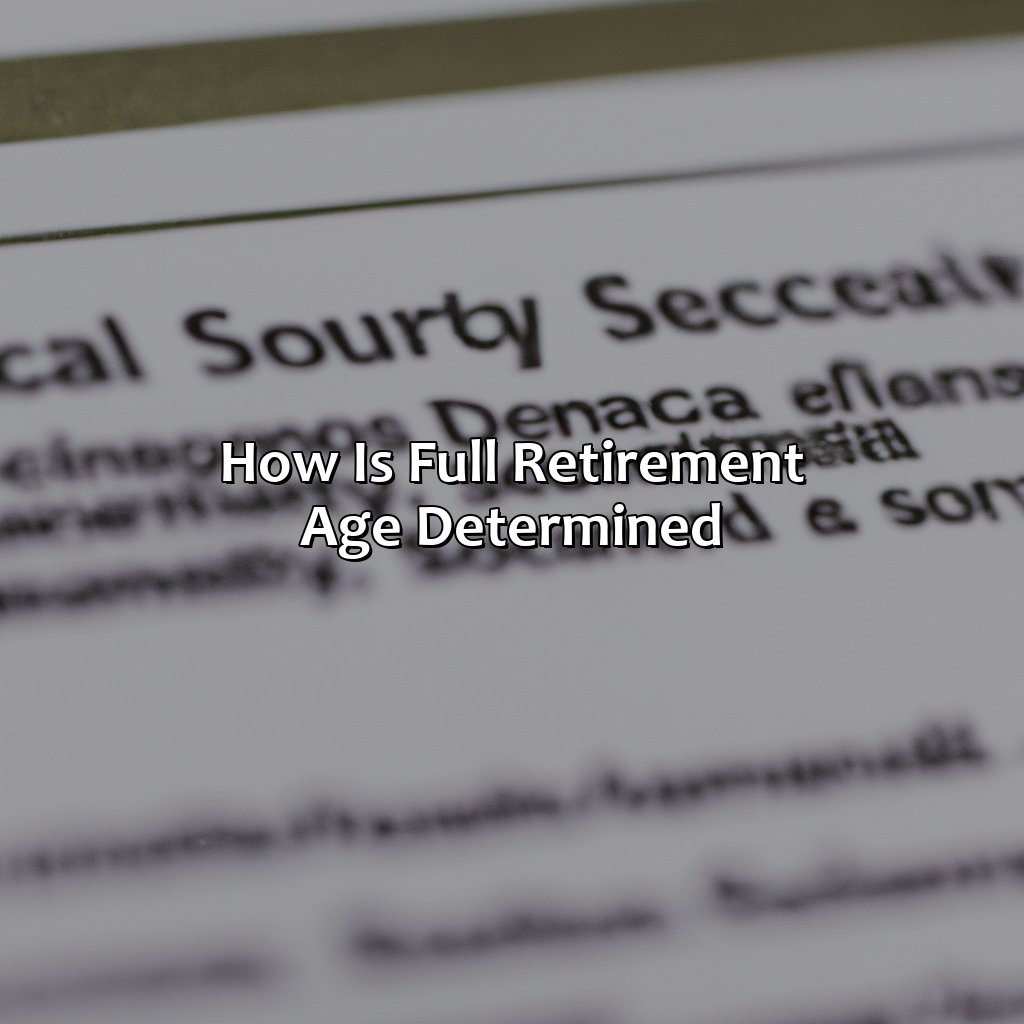What Is The Full Retirement Age For Social Security?
Key Takeaway:
- The Full Retirement Age for Social Security is the age at which individuals can receive their full retirement benefits, which is determined by their birth year. The Full Retirement Age is gradually increasing from age 66 to 67 for those born after 1959.
- Factors that affect Full Retirement Age include birth year, earnings history, and whether someone is a surviving spouse or has a disability. Understanding these factors can help individuals plan for retirement and maximize their benefits.
- Waiting until Full Retirement Age to claim Social Security benefits can result in a higher benefit amount, as well as increased spousal and survivor benefits. However, claiming benefits before Full Retirement Age can result in a reduced benefit amount. It’s important to consider personal financial goals and healthcare needs when making the decision to claim benefits.
Are you planning for retirement and want to know your Social Security benefits? This article covers the full retirement age and how it affects your benefits. You can be informed and make the most of your retirement plan.
What is the full retirement age for social security?
To grasp the full retirement age of social security, you must understand its definition and the elements that affect it. This can help you plan for retirement. To have a better comprehension of the matter, let’s look into the definition of full retirement age and the elements which can affect it.

Image credits: retiregenz.com by Yuval Woodhock
Definition of full retirement age
The complete age at which individuals are eligible for full retirement benefits from Social Security is known as the Full Retirement Age or FRA. This age differs based on the individual’s birth year. Failing to understand and anticipate one’s FRA can cause concern upon reaching retirement age, particularly when considering Social Security claiming strategies.
Calculating your own FRA can be difficult, considering its complexity and range of factors involved. This calculation heavily relies on birth year calculations and the length of time you’ve worked. The earliest anyone can retire under Social Security is 62, though they’ll receive less money than if they wait until their FRA to retire; delaying past your full retirement age will result in higher monthly benefits.
It should be noted that delaying claiming offers a significant advantage. If an individual delays benefits past their FRA, their monthly benefit amount could increase through delayed retirement credits until they turn 70 years old. This could provide up to a 132% increase in monthly payments compared to claiming at 62.
Don’t miss out on these opportunities by failing to comprehend your Full Retirement Age! Understand how it is calculated and plan accordingly with guidance from financial advisors or social security experts.
Getting older is like being a car – the more miles you put on, the higher the full retirement age for social security.
Factors affecting full retirement age
The age at which one can start receiving Social Security retirement benefits is known as the full retirement age (FRA). Factors influencing FRA include the year of birth and when benefits are first claimed. Someone born after 1959 has an FRA of 67. If one claims early, their benefit will be reduced; if they wait until after FRA, it will increase up to age 70. Delaying filing until after FRA could result in significantly higher monthly payments.
It’s worth noting that a worker can begin to receive benefits as early as age 62, but doing so permanently reduces the benefit amount. One may want to consider this before claiming too soon.
Pro Tip: Consider delaying filing for social security retirement to increase monthly payments over time and ensure maximum benefits throughout your later years.
I guess you could say full retirement age is determined by a magical combination of government regulations and actuarial tables, but I prefer to think of it as a mysterious and arbitrary number.
How is full retirement age determined?
Your birth date is a key factor in calculating your full retirement age. Retiring earlier or later than full retirement age affects your social security benefits. In this segment, find out how your birth date ties into full retirement age. Plus, comprehend the effects of retiring before or after full retirement age on your social security benefits.

Image credits: retiregenz.com by David Arnold
Date of birth and full retirement age
The full retirement age for social security benefits depends on the individual’s date of birth. The Social Security Administration determines it based on the birth year, and it ranges from 66 to 67 years old.
| Birth Year | Full Retirement Age |
|---|---|
| 1943-1954 | 66 years |
| 1955 | 66 years and two months |
| 1956 | 66 years and four months |
| 1957 | 66 years and six months |
| 1958 | 66 years and eight months |
Moreover, early retirement changes social security’s benefit amount. More specifically, if a person claims before reaching the full retirement age, the monthly payments can decrease by up to thirty percent. According to the Social Security Administration, some delayed retirement credits increase your benefit amount when you wait so that you can claim after your full retirement age.
In January of this year, almost seventy-three million people received benefits from programs provided by the Social Security Administration. Retiring before or after full retirement age is like playing a game of social security roulette – spin the wheel and see if you hit the jackpot or land on a penalty.
Retiring before or after full retirement age affects benefits
Retirement age impacts the benefits one receives in their golden years. The earlier or later the retirement age, the larger the gamble taken on future Social Security payments. Retiring before or after full retirement age affects benefits in numerous ways:
- Retiring early can decrease social security payments, while working past full retirement age increases them.
- Retired citizens who earn more than a certain threshold could face benefit reductions due to additional income.
- Delaying retirement beyond full retirement age could raise social security payouts based on credits accrued.
Retiring before full retirement age can result in permanent reductions of monthly income. People who retire before they reach their FRA and decide to continue earning may see Social Security reduced. Working while receiving Social Security Benefits decreases benefits until you reach your FRA. If you are still working by the time you reach your FRA, any earnings restrictions will expire. Filing for spouse’s benefits and delaying own benefits would increase one’s eventual payout percentages. The earliest starting month for social security is 62 years old—but contemplate waiting until reaching your FRA (age 66) or possibly even beyond when payouts peak.
Another factor to consider as regards eligibility includes disability determinations for Americans with disabilities who nevertheless worked long enough under disability insured employment to be deemed eligible for this status. Further consideration should be given when making decisions about spousal or survivor positions eligible.
During the Great Depression, there was a boost of public activity at table conversations regarding financial protection throughout one’s golden years—pensions provided sustainable income but were far from adequate measurements of financial stability. Hence came up the concept of “Social Insurance” which initiated discussions about funding practices for such programmes as Social Security Act.
Don’t rush into retirement, wait for the full age and enjoy your golden years without worrying about a penny-pinching lifestyle!
Benefits of waiting until full retirement age
Waiting until your full retirement age is an awesome way to increase your social security benefits. The section “Benefits of Waiting Until Full Retirement Age” includes two subsections:
- Benefit Increase Percentage
- Impact on Spousal and Survivor Benefits
These subsections will provide you with information about how waiting until full retirement age can improve your benefits and positively impact those of your spouse or survivors!

Image credits: retiregenz.com by Harry Jones
Benefit increase percentage
Delaying your retirement can lead to a significant increase in the amount of retirement benefits received from Social Security. The rate at which benefits increase is the ‘Benefit increase percentage’.
This percentage varies depending on when an individual chooses to start receiving their social security payments. The longer an individual waits to claim their benefits, the higher the benefit increase percentage will be.
Delaying retirement until reaching full retirement age, or even later, can result in up to a 32% increase in monthly benefits compared to starting at age 62, the earliest age for eligibility. As such, it makes financial sense for many individuals to wait before receiving payments.
Moreover, putting off retirement allows individuals more time to save money and accumulate assets, numbers that won’t be part of calculating future social security payments. It also reduces their reliance on Social Security as the sole source of income during their golden years. Therefore, delaying one’s social security benefit payment may be beneficial for long-term financial planning.
Looks like waiting until full retirement age not only helps you, but also your significant other – talk about a win-win situation for your marriage and your bank account.
Impact on spousal and survivor benefits
Waiting until the full retirement age can have a significant impact on the benefits received by both spouses and survivors. By delaying retirement, spouses can receive a higher percentage of their partner’s Social Security benefits. Similarly, surviving spouses who wait until full retirement age can claim up to 100% of the deceased partner’s benefits.
For spousal benefits, waiting until full retirement age can result in receiving up to 50% of the partner’s Social Security benefits rather than a reduced amount if claimed earlier. Surviving spouses may also be eligible for survivor benefits from a partner who had earned more in Social Security credits.
Unique details include that divorced spouses can still claim spousal or survivor benefits as long as they were married for at least ten years and do not remarry before 60 years old. Delaying claiming Social Security benefits also increases cost-of-living adjustments applied to future payouts.
Suggested strategies include reviewing all potential benefit options with a financial advisor and considering delayed retirement if possible. Waiting until full retirement age or later may result in higher monthly payouts for both spouses and their surviving partners due to delayed retirement credits.
Five Facts About Full Retirement Age for Social Security:
- ✅ The full retirement age for Social Security benefits depends on the year you were born. (Source: Social Security Administration)
- ✅ For those born between 1943 and 1954, the full retirement age is 66 years old. (Source: Social Security Administration)
- ✅ For those born in 1960 or later, the full retirement age is 67 years old. (Source: Social Security Administration)
- ✅ Early retirement is possible at age 62, but benefits are reduced. (Source: AARP)
- ✅ Delaying retirement past full retirement age can increase Social Security benefits. (Source: Social Security Administration)
FAQs about What Is The Full Retirement Age For Social Security?
What is the full retirement age for social security?
The full retirement age for social security depends on the year you were born. For those born between 1943 and 1954, the full retirement age is 66. For those born after 1954, the full retirement age increases gradually until it reaches age 67 for those born in 1960 or later.
What happens if I retire before the full retirement age?
If you retire before your full retirement age, your monthly social security benefits will be reduced. However, if you wait to claim benefits until after your full retirement age, your benefits will be increased.
Can I still work while receiving social security benefits?
Yes, you can still work while receiving social security benefits. However, if you have not yet reached your full retirement age, there are limits on how much you can earn without having your benefits reduced. Once you reach your full retirement age, you can earn as much as you want without any reduction in benefits.
How is my social security benefit amount calculated?
Your social security benefit amount is based on your earnings history. The Social Security Administration calculates your average indexed monthly earnings (AIME) based on your highest 35 years of earnings. The AIME is then used to calculate your primary insurance amount (PIA), which is the amount you would receive at your full retirement age.
Can I delay receiving social security benefits past my full retirement age?
Yes, you can delay receiving social security benefits past your full retirement age. If you delay receiving benefits, your monthly benefit amount will increase for every year you delay, up until age 70. At age 70, your benefit amount will reach its maximum, and there is no additional benefit to delaying any further.
Is it possible to receive social security benefits and disability benefits at the same time?
It is possible to receive social security benefits and disability benefits at the same time. However, the amount you receive may be reduced if you are receiving both types of benefits at the same time. Your total benefit amount cannot be more than 80% of your average pre-disability earnings.


